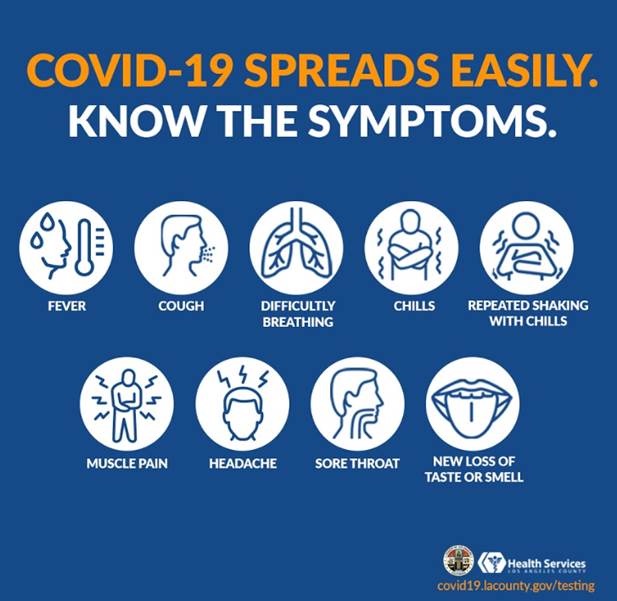On March 11, 2020, the World Health Organization (WHO) officially declared COVID-19 a global pandemic. Within days, Health Services recognized the urgency of communicating information to Health Services empaneled and My Health LA (MHLA) participants on topics such as staying safe and accessing care during the pandemic.
Erika Flores Uribe, from the Patient Facing Communications Committee (PFC) said, “About 80% of our patient population self-identify as communities of color. Given the disproportionate impact of COVID-19 in communities of color, we realized that our patients needed information about COVID-19 – and they needed it quickly. We worked together to ensure they knew how to stay safe, prevent the spread of COVID-19 and how to access care when they needed it.”
As a result, leadership within the Health Services Communications division, Population Health Management, Office of Language Access and Inclusion, Office of Patient Access, the Los Angeles County CEO’s office, MHLA and IT formed the COVID-19 Patient Facing Communication Committee (PFC) in mid-March 2020. The committee created patient-focused information for patients in threshold languages. The team created new content and ran several campaigns, as detailed below:
- A new website: A new patient-facing COVID-19 patient website was developed in English and Spanish. The site includes updates, patient resources, infographics, video public service announcements (PSAs), FAQs and community resource links. To date, the webpage has had over 220,000 visits from over 132,000 unique visitors. Much of the material was also added to the MHLA website.
- E-mail Campaigns: Emails were sent to patients on topics such as Health Services remote access services, the LA Health Portal, obtaining prescriptions by mail, the COVID-19 Nurse Advice Line, phone visits, ER and Urgent Care services and Health Services’ commitment to anti-racism.
- Text Messages: In collaboration with the Los Angeles County CEO’s Office and Countywide Communications division, Health Services sent out seven text messages with videos that focused on keeping safe during COVID-19 (physical distancing, wearing face coverings, mental health etc.) and provided information about available COVID-19 community resources.
- Other Communications: The committee also created and distributed COVID-19 patient education materials, generated automated COVID-19 general information robocalls, updated the Patient Access Call Center (PAC) welcome and on-hold bulletin messages and updated the LA Health Portal homepage, banner, messaging and appointments pages.
The PFC coordinated with Patient Family Advisory Councils to solicit feedback from patient advocates, and had educators review the materials for content and literacy level before they were translated into Spanish and other threshold languages. The PFC worked closely with the Health Services COVID Oversight Committee (COC) and Health Services leadership to communicate the information.
As a result of this effort, a total of 3.3 million text messages, emails, and robocalls were sent to more than 284,000 Health Services empaneled patients and 111,000 MHLA program participants. Analysis of the effort shows that the most successful method of communication was texting. The Community Resources text message was most effective in driving users to the website. Unsurprisingly, the most challenging aspect of rolling out the communication strategy was having good contact information for our patients, especially phone numbers collected by Community Partner (CP) clinics for the MHLA program.
The Patient-Facing Communications Committee was led by Anshu Abhat and Erika Flores Uribe and included Wendy Burton, Philip Barragan, Marina Alvarez, Anna Gorman, Ray Plaza, Vanna Tran, Mary Mercado and Diamond Lee with IT lead support from Mana Ly and Rebecca Yang.

